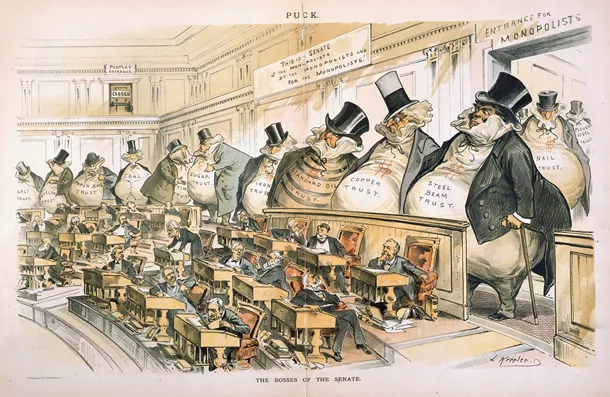Intro
I think my key takeaway from this lecture is the importance of the definition of monopoly. Traditionally, we think of a monopolist as an uber rich businessman or some such resemblance to the political cartoons seen in history books. Either way, the image monopoly conjures up is one of a corporation that is too big to fail that is so powerful they can raise prices to be whatever they want while the consumer has no choice or power to stop them. Such an entity would be dangerous and need to be controlled by laws. This is the conclusion a rational consumer would come to. This is the stereotypical idea of a monopoly that I had in mind coming into this week. But such an entity does not seem to exist naturally. Dr. Bylund suggests that any innovator could be considered a monopolist because the product they create is one of a kind and only they have the power to sell it.
Power
Power is another concept that was focused on in Bylund’s lecture. He stresses the difference between a company having control over consumers because their product or service is in high demand, and a company having control over consumers because there are no other alternatives for the product or service they provide. Bylund sees no issue with the former, and neither do I. A corporation having monopoly power due to the innovation of their product or service is the natural way that a free market works and is the incentive at the heart of entrepreneurship. If the company is not providing something customers are willing to pay a certain price for, they will not succeed. And when they no longer satisfy their customers, another innovator will take their place.
Competition
Bylund asserts that new entrants compete by one of two methods: either by price, or by differentiation. If a would-be-monopoly raises prices beyond the value they provide to customers, that is the signal for entrepreneurs to rush in and compete on price. This is a check against what people traditionally fear a monopoly to be. Because of this check, such a monopoly should never occur naturally under a free market. The other way new entrants can compete is by differentiation, or innovation. In this way, a leader in a market is replaced by a company that has innovated, and their product or service has become more desirable because of it. This new company then becomes the leader that has the power of the most desirable product. But this power is not one that is unfair or that should be feared. It is simply the power of demand. It is not the corrupt power typically thought of when the word monopoly is brought up. By painting this picture of monopoly power, Bylund helps us see the conditions under which a real monopoly that has unfair power is created.
Government
The entity that creates true monopoly is government. Only under legally binding conditions can a corporation be the sole provider of a good or service with barriers to entry that completely prevent any other competitors from challenging them. This is ironic because people look to the government for laws to protect them against monopolies, yet the very same agent is the one that creates the conditions for a real monopoly that consumers fear. So, the logical conclusion is less government, less monopoly. This concept of power also goes back to something we discussed in the first week. Whoever has a monopoly on force, or violence, has true power. Since the government has a monopoly on force, they have true power. And through government regulations, they give monopoly power to certain corporations. Only in situations in which unnatural barriers to entry are present do true monopolies exist.
Conclusion
I think the distinguishing features pointed out by Bylund are significantly important. Too many people have a view of monopoly that is far different from what is naturally occurring. The real issue that should be addressed is that of government mandated monopolies. There should be no industry in which the barrier to entry is so high that competitors cannot arise to challenge leaders. And the only cases in which such an unreasonably high barrier to entry exists are those where the barrier is imposed by the government. I think that all such regulations should be removed. If the government is no longer able to set regulations that create monopolies, then competition would thrive, and the consumer would only benefit. If this idea is wrong, then it would quickly become apparent and appropriate steps could be taken. But until such a lassez-faire approach is taken, we will continue to see true monopoly present only in highly regulated areas.
